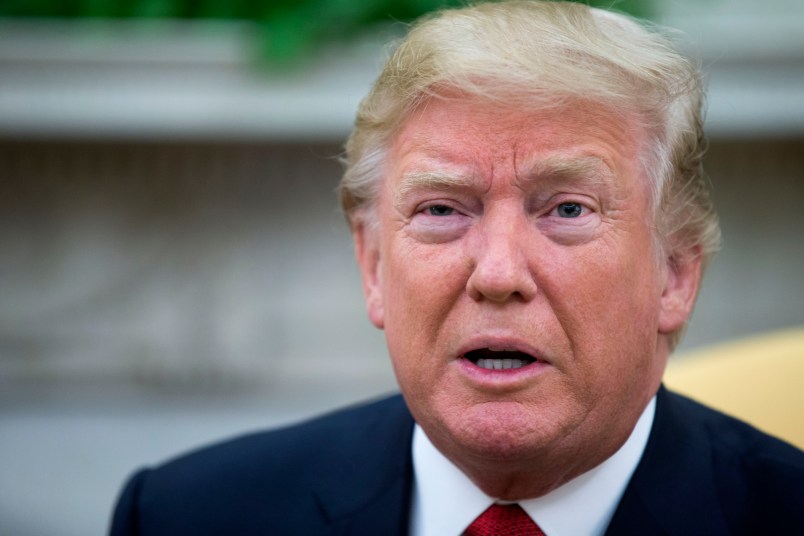Former Trump campaign adviser George Papadopoulos pleaded guilty earlier this month to making false statements to FBI agents about his contacts with Russian nationals that continued late into the summer before the 2016 election. The case was unsealed Monday.
Papadopoulos acknowledged in a statement of offense that he lied about those communications during a January 2017 interview with FBI agents, and that he subsequently “impeded the FBI’s ongoing investigation” into potential collusion between the Trump campaign and Russia.
According to the statement, Papadopoulos was in regular contact with three individuals he believed to have high-level ties with the Kremlin from the time he came onboard as a foreign policy adviser to the Trump campaign in March 2016 through at least August of that year, and he regularly informed other members of the Trump campaign about those communications.
One of those individuals was a London-based professor of diplomacy who claimed to have “substantial connections to Russian government officials,” including members of the Russian Ministry of Foreign Affairs, and who told Papadopoulos that he learned on a trip to Moscow that the Russian government had obtained “dirt” and “thousands of emails” on Hillary Clinton.
He was arrested on July 27 upon landing at Dulles International Airport and has since “met with the Government on numerous occasion to provide information and answer questions,” according to the statement.
News of Papadopoulos’ cooperation with the U.S. government came the same day a 12-count federal indictment was unsealed against former Trump campaign chairman Paul Manafort and his business partner, Rick Gates, alleging a $75 million money-laundering conspiracy.
White House Press Secretary Sarah Huckabee Sanders attempted to distance Papadopolous from the campaign repeatedly during Monday’s press briefing, insisting he played an “extremely limited” role as a “volunteer.” He was one of five members of the Trump campaign’s foreign policy team.
According to the statement, Papadopoulos had lunch with the London-based professor and a woman he described in an email to the campaign supervisor and other members of the foreign policy team as “Putin’s niece” just three days after he came on board in March 2016. The purpose of the meeting, he wrote, was to “discuss U.S.-Russia ties under President Trump.”
Papadopoulos continued to engage with the woman he believed to be Putin’s niece to try to organize a Trump campaign foreign policy trip to Russia, according to the statement. No such trip ultimately occurred.
It turns out that woman was not actually a relative of Russian President Vladimir Putin, as the statement notes. But that contact nevertheless set off a months-long exchange in which Papadopoulos tried to broker an in-person, off-the-record meeting between members of the Russian government and the Trump campaign.
He even made the pitch to Trump himself: according to the statement, Papadopoulos introduced himself at a March 2016 meeting with the GOP candidate by saying “he had connections that could help arrange a meeting between” Trump and Putin.
The professor later introduced Papadopoulos to a second foreign national with whom he exchanged a volley of emails. That individual repeatedly informed him that his contacts at Russia’s Ministry of Foreign Affairs (MFA) were “open for cooperation” with the Trump campaign. Papadopoulos forwarded one May 2016 email about this interest from the MFA to “three separate individuals who at the time were senior officials with the Campaign,” according to the statement.
As the Washington Post previously reported, one of those recipients was Manafort, who forwarded the message to Gates, who he brought with him onto the campaign.
“Let[’]s discuss,” the forwarded email read, as quoted in the statement. “We need someone to communicate that DT is not doing these trips. It should be someone low level in the campaign so as not to send any signal.”
Despite that protestation, Papadopoulos’ back-channel maneuverings were applauded and even encouraged by some on the Trump campaign.
“Great work,” Papadopoulos was told by a “Campaign supervisor” after he informed that individual of his initial lunch regarding boosting Trump-Russia relations. Days before Manafort abruptly left the campaign over his work for a pro-Russian Ukrainian political party in August 2016, a campaign supervisor wrote Papadopoulos, “I would encourage you” to “make the trip if it is feasible,” according to the statement.
Papadopoulos subsequently admitted that he lied about the extent of his communications in his voluntary FBI interview in January in Chicago, in which he told agents he thought the professor was “BS’ing” about his ties to Russian nationals and was “a nothing.”
The former Trump aide had also falsely said that the professor told him the Russians had “thousands of emails” and “dirt” on Clinton before he ever joined the campaign; the professor actually told him about the emails in April 2016, after he’d been with the campaign for weeks.
At a second FBI interview in February, accompanied by his counsel, Papadopoulos said he would willingly “cooperate” with the probe. But according to the statement, he deleted his longtime Facebook account that he used to communicate with Russian nationals and that contained information that contradicted his statements to the FBI the very next day; a few days later, he stopped using his cell phone and acquired a new number, too.
Trump has not yet commented on Papadopoulos’ guilty plea, though he downplayed the indictment against Manafort and Gates in a pair of Monday morning tweets that said their indictments were unrelated to their work on his campaign.
“NO COLLUSION!” Trump blared.
The Papadopoulos plea, however, touches directly on the inner workings of the President’s campaign.
Read Papadopoulos’ statement of offense below:
This post has been updated.







UnFair to blaMe trumP. He onLy hireD Manafort. Also, HitlarY colluded wiTh russiA not Trump!
This is large … it may not seem so now, but it is.
By any reading, it’s astoundingly damaging. And they kept it absolutely quiet for almost a month. It’s amazing. Today is going to get very, very stupid.
Thanks Boris.
Collusion.